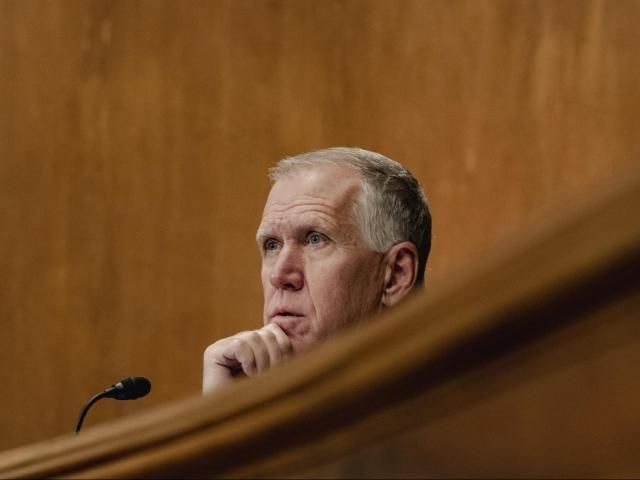As the U.S. Senate considers president-elect Donald Trump’s nominees for top government leadership positions, political analysts say no Republican will face more scrutiny than North Carolina’s Thom Tillis.
Tillis is expected to seek reelection in 2026 in a state with some of the nation’s narrowest election margins.
To win, political analysts say, Tillis will have to walk a tightrope: Support Trump’s agenda enough to please a GOP base that has been hostile toward him, while maintaining enough independence to woo moderate voters in 2026, a year that’s expected to be favorable for Democrats. In midterm elections, the party that just won the White House almost always loses seats in Congress.
“It’s fair to call Tillis the most vulnerable Republican senator up in 2026,” said J. Miles Coleman, associate editor of Sabato’s Crystal Ball, a nonpartisan political analysis and forecasting newsletter at the University of Virginia Center for Politics. Because of the way Senate elections are staggered, not all states have a Senate election in 2026 — a fact that could focus extra attention, and national Democratic spending, on Tillis.
Tillis’s path to reelection might have been easier if Vice President Kamala Harris had defeated Trump in the presidential election, analysts said. He could have endeared himself to conservatives by vocally opposing another Democratic administration, and then sought reelection in a Republican-friendly environment.
That’s not what happened. And now, Tillis’ loyalty to Trump could be tested before the president-elect even takes office.
Several of Trump’s nominations — former U.S. Rep. Tulsi Gabbard for Director of National Intelligence, former U.S. Rep. Matt Gaetz for U.S. Attorney General and anti-vaccine activist Robert F. Kennedy Jr. to lead the Department of Health and Human Services — are facing backlash from Democrats and some Republicans.
“Democrats are absolutely getting the popcorn out to watch and see how Thom Tillis fares with a Donald Trump presidency,” said Morgan Jackson, a political strategist who has worked with Democratic North Carolina Gov. Roy Cooper and the state’s Democratic Governor-elect Josh Stein.
As the Republican Party has morphed in the past eight years into a party shaped by Trump and his supporters’ views, moderate Republicans have either been voted out or not sought reelection.
With the GOP expecting a 53-to-47 edge in the Senate starting in 2025, Tillis is likely to be watched by members of both parties as one of the small number of Republicans who might oppose Trump on some issues. He’s shown a willingness to work across the aisle in the past, taking the lead on bipartisan efforts — some successful, some not — to reform immigration policy, pass red flag gun control measures and protect same-sex marriage rights.
Tillis won his Senate seat in 2014 as a state legislator who had helped Republicans take control of North Carolina’s legislature for the first time in 100 years. As the speaker of the state House, he helped usher in a wave of conservative legislation. Yet by the time Tillis hit the campaign trail to seek reelection in 2020, he was being booed by Republicans at Trump rallies.
“Trump and the Republican base place loyalty above every other characteristic — over experience, over ideas, over right or wrong,” said Jackson, the Democratic strategist. “So, Tillis is in a very challenging position.”
Jordan Shaw, a longtime advisor to Tillis, told WRAL that Tillis is focused on helping Trump and the new Senate Republican majority get off to a strong start.
“Tillis has already won the two most expensive Senate races in history, despite the left throwing everything they had at him,” Shaw said. “With the 2026 midterms on the horizon, make no mistake: Senator Tillis will have a historic amount of resources, infrastructure and a record of results to run on. We are already operating toward another successful campaign for North Carolina’s senior Senator.”
Trump’s appointments
Gabbard, Gaetz and Kennedy — who appeal to the GOP’s right wing — could face pushback from Tillis, either because they run afoul of the senator’s stated values or by potentially damaging his reelection chances.
Gabbard, who has served in the Army National Guard for more than two decades, has defended Russia and Russia-backed Syrian dictator Bashar al-Assad — positions that could hamper relations with some U.S. allies. She quit Congress in 2020 and left the Democratic Party the next year following allegations by party leaders that she was a Russian government agent. She has denied those allegations. Tillis, the co-chair of the Senate’s NATO caucus, has been a vocal supporter of Ukraine’s right to defend itself since Russia invaded it in 2022.
Gaetz, a Florida Republican, is a Trump ally who led a push to oust former U.S. House Speaker Kevin McCarthy. Gaetz has also been under investigation by the House Ethics Committee over allegations including sexual misconduct, illicit drug use, accepting improper gifts and obstructing government probes. Gaetz has denied the allegations. He recently resigned from the House — a move that could halt publication of the findings of the committee’s investigation into him.
John Bolton, Trump’s former national security advisor, told CNN he thought Trump’s nomination of Gabbard “was the worst cabinet-level appointment in history — until I heard about the Matt Gaetz appointment.”
Tillis hasn’t said how he’ll vote on Gaetz but suggested the nominee may not get the votes needed. Gaetz “has his work cut out for him,” Tillis told reporters Wednesday.
On Thursday, Tillis vowed to give him a fair hearing, saying: “I barely know Gaetz. All I know is that he likes picking fights on social media. He’ll have to deal with that in committee. But I don’t know his background. I’m going to look at it and give him a fair hearing.”
Kennedy, meanwhile, is known for baseless claims about vaccines and unconfirmed theories about public health. Health care and pharmaceutical companies have a strong presence in North Carolina, and together those industries contributed more than $1.2 million to Tillis’s reelection campaign in 2020, according to OpenSecrets, a nonprofit group that tracks campaign contributions. That election, Democrats cast Tillis as “pharma’s favorite senator.” After Kennedy’s nomination, share prices of some pharmaceutical companies took a hit.
Senate confirmation hearings don’t usually provide fodder for campaign ads, said Asher Hildebrand, an associate professor at Duke University who worked as chief of staff for Democratic former U.S. Rep. David Price. But their after-effects might.
“Does Tillis voting for RFK hurt his reelection? I don’t know. But if we don’t have fluoride in the drinking water, or vaccines available a year from now, that really starts to hurt him,” Hildebrand said, referring to Kennedy’s call to rid drinking water of fluoride, a naturally-occurring mineral with a history of being safe and beneficial for oral health.
Potential challengers
On Trump’s appointees, or on any other politically controversial vote over the next two years, Tillis risks taking stances that could cost him the 2026 election — the question is whether that danger is in the general election or the GOP primary.
Standing up to Trump on some issues could endear him to moderates, a key North Carolina constituency.
But if he gets too far out of step with his party, he risks further ire from a GOP base that already dislikes him — a scenario that could open the door for more conservative Republicans to challenge Tillis. At its annual convention in 2023, the North Carolina Republican Party voted to formally censure Tillis. The party cited his work protecting same-sex marriage rights and his brief objection, later rescinded, to Trump’s first-term plan to fund border-wall construction using money from the military budget.
Chief among the possible challengers is North Carolina Lt. Gov. Mark Robinson, whom Tillis spoke out against in the race for governor this year. Tillis said he didn’t think Robinson could win the general election and was right: Robinson lost to Stein by 15 percentage points. But Robinson remains highly popular among the most dedicated party activists, who are also some of the mostly likely to vote in the state’s low-turnout primary elections.
When Robinson conceded defeat on election night earlier this month, he told supporters the 2024 elections might not be the last time they see him on the campaign trail: “Who knows — maybe in the future,” Robinson said, adding that he plans to assess his political future and spend more time with his family. A Robinson spokesman told WRAL on Thursday that the lieutenant governor had no new updates on his political future.
Robinson last week urged his 167,000 followers on the X social media platform to call the offices of Tillis and Republican Ted Budd, North Carolina’s junior U.S. senator, to demand that they support Florida Republican Rick Scott for Senate majority leader to replace Mitch McConnell. Scott came in third of the three candidates running; Tillis did not support his bid.
“What happens next will separate the strong from the weak, the fighters from the cowards, ‘We The People’ from the Washington Uniparty,” Robinson posted. “Stay very vigilant. Do not let the people in office back down from the promises they made when they wanted your vote.”
Another Republican politician favored by the GOP base is Michele Morrow. In the race for state school superintendent, she beat Republican incumbent Catherine Truitt but lost the general election to Democrat Mo Green. Morrow has continued to demonstrate a desire to climb the political ladder, despite election losses at the local and state level. She told WRAL last week that she would like to serve in the Trump administration on education policy.
Open seats and weak incumbents tend to draw challengers. Prior to the 2020 election, businessman and political newcomer Garland Tucker spent $1.6 million of his own money running against Tillis — but dropped out after Trump endorsed the incumbent senator. This year, GOP primaries for some U.S. House of Representatives seats drew nearly two dozen candidates.
Indeed, incumbents have a way of emerging — especially if the party views them as the best option to defend the seat.
Which Democrats would run?
With Tillis’ seat presenting perhaps the nation’s best shot at flipping a Senate seat for the Democratic Party in 2026, the party will be focused on putting forward a strong candidate.
Cooper is the most obvious name some political observers bring up. He enjoys widespread popularity among Democrats and independents, as well as some Republicans. He won the governorship in 2016 and again in 2020; both times emerging victorious even as North Carolina voters also picked Trump for president.
Cooper would likely win the Democratic primary if he did run. But he has been coy about his future plans, saying for months that he’s focused on finishing his time as governor.
“I’m going to run through the tape,” Cooper said in August. “I’m going to work with this administration to do everything we can. And when I get to the end of my term — I do like public service — I’ll see what’s next.”
Even out of office, Republicans may work to keep Cooper’s name in the news. Some in the party have directed blame his way for what they’ve described as a slow government response to both Hurricane Helene and Hurricane Matthew in 2016.
“If he did try to campaign in Eastern North Carolina, he’s going to face a lot of uncomfortable questions about why hurricane victims never got back into their homes during his eight years as governor,” said Jonathan Felts, a Republican political strategist.
However, Felts added: “It’s a bit of a moot point to discuss it now, as two years is about eight political lifetimes these days.”
If Cooper ran and won, it’s possible his win still wouldn’t be enough for Democrats to regain their majority — a factor that could cause him to forgo a Senate campaign.
“He’s going to be 70 years old,” said Pat Ryan, a Raleigh-based Republican political consultant. “And I don’t know Roy Cooper, but I don’t necessarily see him wanting to go from being the top dog in the state, to some random back-bencher in the Senate.”
U.S. Rep. Jeff Jackson, a Democrat who won this year’s race for state attorney general, launched a run for U.S. Senate in 2022 before suspending his campaign and supporting the eventual Democratic nominee, Cheri Beasley. Jackson would be another strong contender for the nomination if he entered the race, political analysts said.
U.S. Rep. Wiley Nickel, who opted against reelection after state lawmakers redrew his district, is also exploring a Senate run. On Wednesday, he encouraged Tillis on social media to “take an honest look in the mirror” if he thinks Gaetz is qualified to be attorney general.
In a telephone interview with WRAL, Nickel said he’s still weighing his options. However, he offered a warning to 2026 Senate candidates: Voters “don’t want the culture-war issues,” Nickel said. “We want folks solving problems.”
In that vein, Coleman, the Virginia-based political analyst, believes Republicans are best suited to keep the Senate seat with Tillis as their nominee. And it won’t be easy for Democrats to knock him out, Coleman said. Tillis has shown he can survive a barrage of attacks from the left and the right.
“Tillis may have some vulnerabilities,” Coleman said. “But the onus will be on Democrats to capitalize on them.”
WRAL reporter Brian Murphy contributed to this report.


















